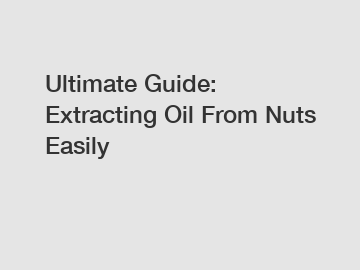Ultimate Guide: Extracting Oil From Nuts Easily
Nuts are not only delicious to eat but they also have a host of health benefits. One of the most common nuts consumed worldwide is the almond, which is not only full of healthy fats and protein but also contains vitamin E, magnesium, and fiber. Another popular nut is the walnut, which is rich in omega-3 fatty acids, antioxidants, and anti-inflammatory properties. Then there's the mighty cashew, packed with vitamins and minerals such as iron, zinc, and magnesium. However, did you know that nuts can also be a valuable source of oil?
Extracting oil from nuts is a process that has been utilized for centuries. The oils extracted from nuts are not only flavorful but they also contain essential fatty acids that are beneficial for overall health. If you're a health-conscious individual who loves to create your own culinary masterpieces, then extracting oil from nuts may be a fun and rewarding endeavor for you.
In this ultimate guide, we will walk you through the step-by-step process of extracting oil from nuts easily. Whether you're a seasoned chef or a novice in the kitchen, this guide will help you harness the power of nuts to create your own high-quality, unprocessed oils.

Step 1: Choosing the Right Nuts.
The first step in extracting oil from nuts is to choose the right type of nuts. While you can technically extract oil from any type of nut, some nuts are better suited for oil extraction than others. Here are a few popular nuts that are commonly used for oil extraction:
- Almonds.
- Walnuts.
- Cashews.
- Peanuts.
- Macadamia nuts.
It's important to note that some nuts may require additional processing before they can be used for oil extraction. For example, peanuts need to be shelled and roasted before they can be used to extract oil. Make sure to research the specific requirements for the nuts you choose before moving on to the next step.
Step 2: Grinding the Nuts.
Once you have selected the nuts you want to use for oil extraction, the next step is to grind them into a fine powder. You can use a food processor or blender to grind the nuts, making sure to blend them until they reach a smooth, buttery consistency. The finer the powder, the easier it will be to extract the oil from the nuts.
Step 3: Extracting the Oil.
There are several methods you can use to extract oil from nuts, but one of the most common and easiest methods is to use a press. You can purchase a manual oil press or an electric oil press, both of which are designed to squeeze the oil out of the ground nuts. Simply follow the instructions provided with the press to extract the oil from the nuts.
Another popular method for extracting oil from nuts is to use a cold-press method. Cold-pressing involves applying pressure to the ground nuts without the use of heat, which helps to preserve the flavor and nutritional value of the oil. You can also use a cheesecloth or muslin cloth to squeeze the oil out of the ground nuts by hand.
Step 4: Filtering the Oil.
Once you have extracted the oil from the nuts, the next step is to filter it to remove any impurities or solids. You can use a strainer, cheesecloth, or a fine mesh sieve to filter the oil, making sure to press out any remaining oil from the ground nuts. Allow the oil to sit for a few hours to allow any remaining solids to settle at the bottom before transferring the clear oil to a clean, airtight container.
Step 5: Storing the Oil.
After filtering the oil, it's important to store it properly to prevent it from spoiling. Store the oil in a cool, dark place away from direct sunlight and heat to preserve its freshness and flavor. You can also store the oil in the refrigerator for an extended shelf life.
Using freshly extracted nut oil can add a burst of flavor to your dishes and provide you with a host of health benefits. Whether you use the oil for cooking, baking, or salad dressings, incorporating nut oil into your culinary repertoire can elevate your dishes to a whole new level.
In conclusion, extracting oil from nuts is a fun and rewarding process that allows you to create your own high-quality, unprocessed oils at home. By following the steps outlined in this ultimate guide, you can easily extract oil from nuts and reap the nutritional benefits they have to offer. So, why not give it a try and start experimenting with different nuts to create your own unique oils? Your taste buds and your body will thank you for it!
Contact us to discuss your requirements of edible oil refining machine, hot oil press machine, small edible oil refinery equipment. Our experienced sales team can help you identify the options that best suit your needs.
187
0
0

Comments
All Comments (0)